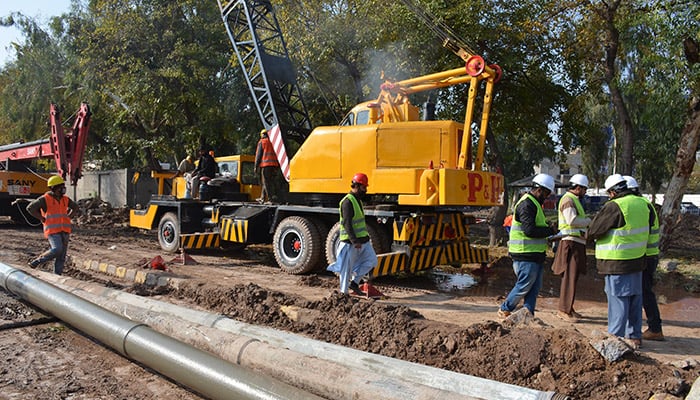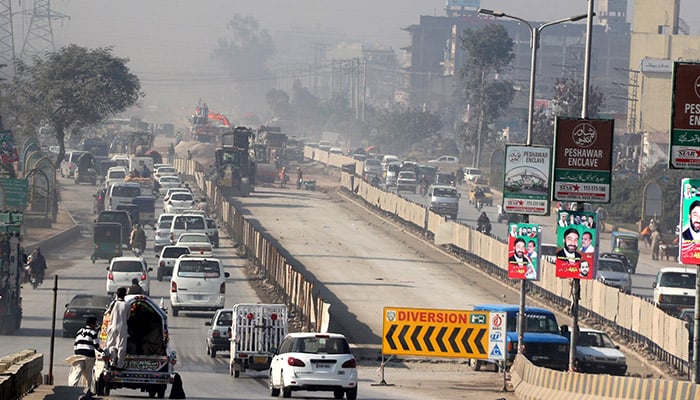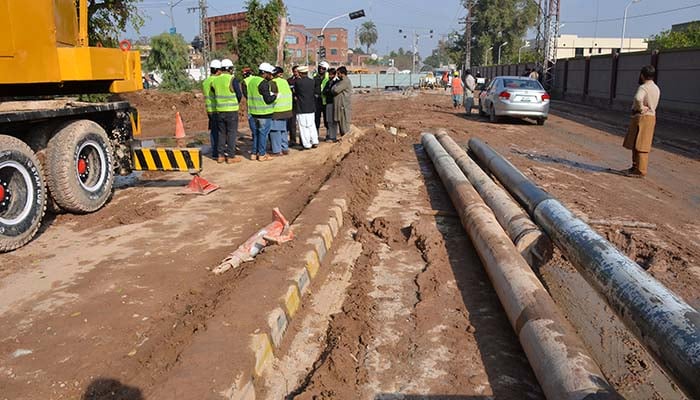Peshawar is likely to open its first Bus-Rapid-Transit (BRT) line in April, which will offer its 1.9 million residents an affordable and flexible alternative for travelling.
The Rs49 billion project was initiated in October last year. Since then, work has been progressing at breakneck speed. Dedicated bus lanes and stations are being constructed around the city on a corridor that extends over 26 kilometres from the Chamkani area to Hayatabad.
Pakistan has rolled out similar metro bus projects in other cities, such as Lahore, Rawalpindi, Islamabad and Multan.
Peshawar’s current public transport system leaves a lot to be desired, especially in high-density areas.
Infuriated commuters often complain about rickety buses, heavy ticket prices and long waiting time. Students like Jamil Ahmed have to wait at a bus stop for over one hour to take a ride to their colleges. “I always end up running late for my classes,” he tells Geo.tv. “I want the BRT to be complete as soon as possible.”
A woman standing beside him chimes in, “Public buses are not very safe for women. I have never felt comfortable. Hopefully, in the new transportation system, there will be separate compartments for females.”
As per the blueprints, stations at the Chamkani, Dabgari and Hayatabad area will open up for shops and provide plenty of parking space — in case passengers want to leave their cars in the parking lot.
In total, the BRT will run on eight feeder routes and have 32 stations. More than 300 air-conditioned buses have been readied, with each bus having close to 90 seats.
The project has been divided into three phases: Chamkani to Soekarno Chowk, Soekarno Chowk to Aman Chowk and Aman Chowk to Hayatabad. Construction on all three phases is ongoing simultaneously.
While the Pakistan Tehreek-e-Insaaf-led provincial government is adamant to have the buses up and running by April, some in the power corridors are not too sure about the deadline.
A provincial minister who spoke to Geo.tv on condition of anonymity said that at the current pace only 70 per cent can be complete before the summer holidays. This may be a problem, as national elections are scheduled in August. Big projects like the BRT, if finished on time, will likely be trumpeted by the PTI to sway voters.
However, Israrul Haq, the director general of the Peshawar Development Authority, rubbishes any such estimates. “Delaying the project is unthinkable,” he says, “The contractors have been warned that failure to complete the project on time will result in legal proceedings.”
Syed Masood Shah, the senior director of Maqbool Calson, a construction firm which has been awarded the project, agrees that the BRT will be zooming through the city in a few months. Maqbool Calson is working in collaboration with a Chinese firm, which has, of late, become very controversial.
The same company was earlier employed to work on the Orange Metro Train Line, Lahore’s first metro train project, in Punjab, where PTI’s rival party, the Pakistan Muslim League-Nawaz is ruling. But the contract was soon retracted and the company blacklisted in the province after it was found to be using substandard construction material and delaying the work, an official of the Lahore Development Authority admitted. Shah rubbishes any such allegations and adds that in addition to the Peshawar BRT, they have contracts to work on Karachi’s Green Line Metro bus and a few other China Pakistan Economic Corridor projects.
Funding for the fixed-rail transit has largely come from the Asian Development Bank, which loaned Rs42 billion for it, while Rs7 billion is being provided by the Khyber Pakhtunkhwa government.
Once complete, says Kamran Rehman, the provincial transport secretary, the buses will carry over 40,000 passengers daily.





